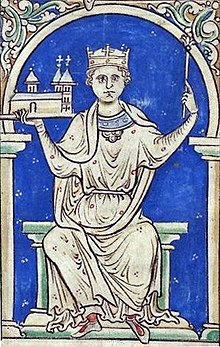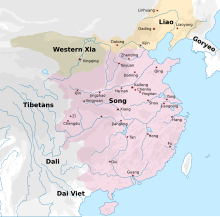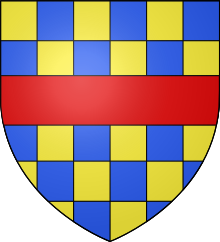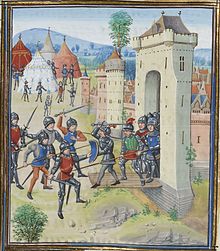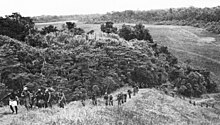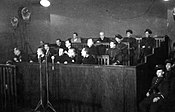Portal:History
The History Portal

History by Frederick Dielman
History (derived from Ancient Greek ἱστορία (historía) 'inquiry; knowledge acquired by investigation') is the systematic study and documentation of the human past. History is an academic discipline which uses a narrative to describe, examine, question, and analyze past events, and investigate their patterns of cause and effect. Historians debate which narrative best explains an event, as well as the significance of different causes and effects. Historians debate the nature of history as an end in itself, and its usefulness in giving perspective on the problems of the present.
The period of events before the invention of writing systems is considered prehistory. "History" is an umbrella term comprising past events as well as the memory, discovery, collection, organization, presentation, and interpretation of these events. Historians seek knowledge of the past using historical sources such as written documents, oral accounts or traditional oral histories, art and material artifacts, and ecological markers.
Stories common to a particular culture, but not supported by external sources (such as the tales surrounding King Arthur), are usually classified as cultural heritage or legends. History differs from myth in that it is supported by verifiable evidence. However, ancient cultural influences have helped create variant interpretations of the nature of history, which have evolved over the centuries and continue to change today. The modern study of history is wide-ranging, and includes the study of specific regions and certain topical or thematic elements of historical investigation. History is taught as a part of primary and secondary education, and the academic study of history is a major discipline in universities.
Herodotus, a 5th-century BCE Greek historian, is often considered the "father of history", as one of the first historians in the Western tradition, though he has been criticized as the "father of lies". Along with his contemporary Thucydides, he helped form the foundations for the modern study of past events and societies. Their works continue to be read today, and the gap between the culture-focused Herodotus and the military-focused Thucydides remains a point of contention or approach in modern historical writing. In East Asia a state chronicle, the Spring and Autumn Annals, was reputed to date from as early as 722 BCE, though only 2nd-century BCE texts have survived. The title "father of history" has also been attributed, in their respective societies, to Sima Qian, Ibn Khaldun, and Kenneth Dike. (Full article...)
Featured picture
Did you know (auto generated)

- ... that at the time, the Fountain Fire was the third-most destructive wildfire in California's recorded history?
- ... that for 19 years Tonya Burns had the only retired jersey number in Iowa State women's basketball history?
- ... that the compilation of the Wu shu was hampered by the execution of two members of the committee compiling the text?
- ... that the Three Bards are the most celebrated poets in the history of Polish literature?
- ... that the elite men's race at today's London Marathon is expected to feature three of the five fastest men in history?
- ... that a historian lamented the lack of English-language translations for the work of Aracy Amaral despite it being "a vital reference for the study of art history in Brazil"?
Roger Norreis (died between 1223 and 1225) was Abbot of Evesham in England. He was a controversial figure, installed in several offices against opposition. In his appointment to Evesham, he was accused of immoral behaviour and failing to follow monastic rules. In 1202, Norreis became embroiled in a dispute with his monks and his episcopal superior the Bishop of Worcester; litigation and argumentation lasted until his deposition in 1213. He was then appointed prior of a subsidiary monastic house of Evesham, but was deposed within months, then re-appointed to the office five years later.
Norreis has been described by modern historians as being unsuited for the religious positions to which he was appointed and by one of being completely unsuitable to hold any kind of spiritual role. Nevertheless, even his most severe contemporary critic, Thomas of Marlborough, one of his own monks at Evesham, conceded that Norreis was energetic, entertaining, and enterprising; during his time as abbot of Evesham Abbey he managed to complete the crossing tower of the monastic church. (Full article...)
On this day
November 14: World Diabetes Day; Dobruja Day in Romania

- 1941 – Second World War: After suffering torpedo damage the previous day, the British aircraft carrier HMS Ark Royal sank as she was being towed to Gibraltar for repairs.
- 1969 – Apollo 12 (pictured) launched from the Kennedy Space Center, becoming the second crewed flight to land on the Moon.
- 1990 – Music producer Frank Farian admitted that the German R&B duo Milli Vanilli did not sing the vocals on their album Girl You Know It's True.
- 1992 – In poor conditions caused by Cyclone Forrest, Vietnam Airlines Flight 474 crashed near Nha Trang, killing 30 people.
- 2003 – Astronomers Michael E. Brown, Chad Trujillo, and David L. Rabinowitz discovered the trans-Neptunian object Sedna.
- Mikayel Nalbandian (b. 1829)
- John Abercrombie (d. 1844)
- Franz Müller (d. 1864)
- Bernard Hinault (b. 1954)
Selected quote
Who controls the past controls the future: who controls the present controls the past.
— George Orwell, author, in Nineteen-Eighty Four
Related portals
More Did you know...
- ... that the anti-religious campaign culminating in the Stalinist show trial of the Kraków Curia (pictured) led to the imprisonment of 123 Polish Roman Catholic priests in just one year?
- ... that Confederate brigadier general Alfred E. Jackson was pardoned by President Andrew Johnson because of his kindness toward Johnson's family during the Civil War?
- ... that after HMS Porcupine was nearly split in two by a torpedo, the halves were nicknamed HMS Pork and HMS Pine?
- ... that the Experiment was a boat powered by horses running on a treadmill and propelled by a then-novel type of screw propeller?
- ... that one of the highest-ranking generals in China was injured in battle nine times?
- ... that in Mesopotamian mythology, the Apkallu were sent by the god Enki, from Dilmun to teach human beings various aspects of civilization?
- ... that Karl Marx's theory of historical trajectory attempted to prove the long-term unsustainability of capitalism?
- ... that in November 1921, the schooner Cymric collided with a tram in Dublin?
Topics
Categories

History • By period • By region • By topic • By ethnic group • Historiography • Archaeology • Books • Maps • Images • Magazines • Organizations • Fictional • Museums • Pseudohistory • Stubs • Timelines • Chronology • People • Wikipedia historians
WikiProjects
![]() WikiProject History •
Ancient Near East • Australian History • Classical Greece and Rome • Dacia • Former countries • History of Canada • Chinese history • European history • Heraldry and vexillology • Indian history • Jewish history • Medieval Scotland • Mesoamerica • Military history • Middle Ages • History of Science
WikiProject History •
Ancient Near East • Australian History • Classical Greece and Rome • Dacia • Former countries • History of Canada • Chinese history • European history • Heraldry and vexillology • Indian history • Jewish history • Medieval Scotland • Mesoamerica • Military history • Middle Ages • History of Science
WikiProject Time • Days of the Year • Years
WikiProject Biography • Composers • Political figures • Saints • United States Presidents
Things you can do
 |
Here are some tasks awaiting attention:
|
Associated Wikimedia
The following Wikimedia Foundation sister projects provide more on this subject:
-
Commons
Free media repository -
Wikibooks
Free textbooks and manuals -
Wikidata
Free knowledge base -
Wikinews
Free-content news -
Wikiquote
Collection of quotations -
Wikisource
Free-content library -
Wikiversity
Free learning tools -
Wiktionary
Dictionary and thesaurus



